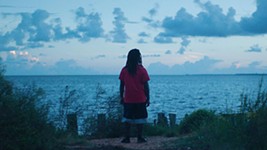Really Over There
The Texas Documentary Tour: Garrett Scott and Ian Olds' 'Occupation: Dreamland'
By Anne S. Lewis, Fri., Oct. 7, 2005

Garrett Scott and Ian Olds shot their film Occupation: Dreamland in early 2004, while embedded with the Army's 82nd Airborne Division, a unit charged with the optimistic original mission of keeping the peace in the Sunni stronghold of Fallujah. When the film's final credits roll, bombs bursting away, the peace never made much less kept, an insurgency so out of control that the 82nd is whisked off to Afghanistan to make way for the Marines, we may feel that our expectations of some kind of narrative arc have been messed with. Here we've just watched a film that delivers the most unvarnished view of the grim, beyond-awful, day-to-day hopelessness of the occupation – and ends just as things get really bad.
Welcome to the war in Iraq.
Scott says the film was made – with no intention of "putting a finger on the scale" – to show the war from the average enlisted man's point of view. And, with six weeks of footage edited down to a lean, keenly observed 78-minute film, it does that very well indeed. Beyond that, Occupation: Dreamland manages to paint a clear-eyed, nuanced picture of how our troops interface with the citizens of the country we've sent them to liberate, and how the Iraqis view their American "rescuers."
Metaphors like (no pun intended) "oil and water" and "bull in a china shop" come to mind. The filmmakers lived with the squad they would shadow in a large, cot-filled room of a former Baathist resort (dubbed "Dreamland" in the Saddam era) just outside of Fallujah. There, they recorded a piece of the day-to-day of the oxymoronic mission of a troop of 1,500 Americans in a city of 300,000: peacekeeping "and" counterinsurgency. The basic drill during this phase of the occupation, Scott explains, was to further the peacekeeping goal by avoiding the highly flammable and visible daytime street violence – the now-familiar, then-sporadic hit-and-run shoot-outs between Americans and the insurgents – and instead, utilize intelligence gathered during the day to locate insurgents and arrest them in their homes during the middle of the night. Some of the most amazing and telling scenes in a film filled with amazing and telling scenes are these green-night-vision raids of suspected insurgents' homes. Enrobed women and children huddle fearfully against the wall while armed men in fatigues clumsily question them (through an interpreter) about a husband or father's whereabouts and his possible illegal activities.
"Maybe 50% of the time, maybe less, maybe more," Scott says, "they may be right and they get the right house and right person." Meanwhile, we scour in vain the faces of a fingered suspect or his cowering family for some indication as to whether their denials are credible and cringe as we watch the rest of the squad tromping through a possibly innocent family's inner sanctum, casually joking about their furnishings and lifestyle. A G.I. wonders what his relatives back home would think if they saw him on one of these night raids.
When we're not with the squad on an adrenaline-rushing night raid or daytime patrol, we're mostly back at Dreamland, enduring the tedium of army life immemorial with the guys – the Christmas-light-draped TV droning in the background, the pin-ups lining the walls, the movie and girlie magazines. The not-so-subtle re-enlistment pushes. Then, in interviews, we learn the backstories of these mostly twentysomething enlisted men: how they ended up in the Army; how they feel about being in Iraq; their politics; what it takes to get them through their enlistment and their escalating bewilderment, cynicism, and fatalism about the mission. ("These people don't give a shit about us – why should we care about helping them?" is a common refrain.) Then we follow them as they walk through town making ham-handed, peacekeeping small talk with the villagers, many of whom, seeing a camera, seize the opportunity to air their complaints about the occupation. In the pandemonium following a sudden sniper attack, a G.I testily collars a suspicious-looking bystander: "Why's this guy smiling at me?" he barks at his interpreter. "He says ... he's 'with you.' ... He wants to 'work for the U.S.,'" the interpreter interprets haltingly. After the smiler is hooded and loaded into the truck, the camera swings around to reveal a group of Iraqi onlookers waving at the camera. You've gotta laugh. This war is such a huge disconnect.
Austin Chronicle: As a threshold matter, how does someone who wants to shoot a film in Iraq get into Iraq?
Garrett Scott: That was my question! Right after the invasion, most people flew into Amman, Jordan – there's a direct flight there from New York every day. There were a lot of large hotels for journalists in Amman and they all had car services that, for $150 to $200, took you to Baghdad – about an eight-hour drive on a straight superhighway, mostly through the western desert of Iraq. It was crazy. There were lots of bandits on the road, especially near Fallujah and Ramadi, and we were scared about that, but we traveled with a group of people, and some of the Iraqi drivers had friends who were armed – though it was often a lot safer just to have some cash, because that was mostly what they were interested in, not your equipment. This was before Abu Ghraib and the occupation had really set in, so they weren't grabbing Westerners and killing them at that point. This road has since been shut down so now everyone has to fly into Baghdad.
AC: What was your agreement with the Army to get permission to shoot this film – did you have to represent what the film would be about?
GS: Yes ... we were very clear, we said we wanted to do an average daily life of enlisted soldiers, and wanted to stay with the squad as long as we could. There were no restrictions on our agenda. I don't think they had anything to hide. Army people are pretty nicely candid, in a way. It's like, no bullshit, man, what do you want to do? We had pretty full access; the only off-limits was the detainee shack – the wooden shack – they weren't going to let us see where the prisoners went or what those conditions were like, and we weren't supposed to take images of Special Forces people. We weren't supposed to ask anything about the chain of command, ask them to say anything about people that were in authority over them – i.e., express opinions about them. They weren't supposed to be discussing U.S. policy: The individuals had been told that when they spoke in uniform, they were talking for the Army even though probably just talking about what they thought and we could get into a lot of trouble – so, they were cautious about saying the wrong thing. The higher you want to go in the military, the thinner the ice; your career can be adversely affected.
AC: So, you didn't feel like you were getting a censored view of any of it?
GS: I don't think so, and I was really worried about that for a while. Still, in moments of paranoia, I'd ask, "Were you really telling us everything?" It was kind of insulting to them, it was like, what do you take us for? They probably wanted to know why I asked this every three weeks.
AC: So the military made no stipulations or reserved rights of pre-approval?
GS: Oh, no, for a number of reasons. One, they don't think of themselves as in the business of censoring journalists – in the very fair-play American kind of way. And they don't have the resources to go through all the footage that the media takes of them – that's not something they want to get involved with. They see the media as doing its job, and they do theirs; they may not always be happy about it, but they don't feel like Big Brother.
AC: Back to the Army guys, the primary focus of your film. What did you come away with after six weeks following them?
GS: I want people to realize that you can join the Army for any reason, but once you're in, you have no choices anymore – you're beyond politics, beyond anything except what you're ordered to do, you're just out there. So, some of them believe in what they're doing, but that doesn't really matter anymore; all they're trying to do is keep each other alive and avoid doing more damage. And some would like to do a lot more damage. It's sort of a wide-angled view of these fairly diverse personalities who are forced together at this particular point in their lives.
AC: How do they cope?
GS: I think they know that what they feel about things isn't going to help or change what they're doing in the Army. Everyone has their head down either waiting to get out of Iraq and think about things later or maybe looking for a way to move higher in their military career. So, they spend a lot of time just sitting around joking and watching TV and reading magazines and then, boom, they're out there in the field in these incredibly dangerous circumstances, all keyed up, and then it's back onto the lower end of the roller coaster. ... I think they really do try to avoid thinking too much – you don't want to think too much in the Army, you just want to think and react. You want to do what you're trained to do – react – and that's the way to pass the time and keep people effective. Rather than doubting and getting confused about things, they're not supposed to be doing that kind of thing. They do think about it, and that's the sort of interesting inner conflict there.
AC: Those scenes of the middle-of-the-night searches of Iraqi homes were really potent. How did you feel holding the camera during these?
GS: It was horrible. We weren't soldiers and we'd been into a lot of Iraqi homes before and [been] shown hospitality, and so it was really disturbing to find yourself running through someone's private space without the mindset of a soldier or a cop – you're thinking, oh my God, what am I doing walking over this person's stuff, and they're cowering in the corner and their kids are scared to death – it was really disturbing. We were putting the final coup de grace on it by taking video of [a situation] that is incredibly humiliating for anybody, but certainly in a culture where women are kept separate in the more religious homes and the domestic sphere is a very protected inner sanctum. ... They didn't see us as different from the Army at all. ... I didn't have any grudge against these people as a people, but I knew perfectly well that some of them were trying to kill the Americans – that was clear.
AC: Could you tell whether someone was lying?
GS: Well, no, no one could. Someone could seem perfectly innocent and they might be totally guilty, but the opposite was also quite possible. It's not a perfect science. Imagine an army occupying a good-sized U.S. city without speaking the language, and then trying to figure out who's who. Forget it. And they sure as hell didn't trust those Iraqi cops or vice versa. There were a lot of people playing both sides and setting them up – no one knows who to trust.
AC: Does the average Iraqi have any idea why the U.S. is doing what it's doing?
GS: Yeah, I think the Iraqis see it pretty clearly. They see a very large, foreign army grasping desperately to try and make something happen and swinging wildly and maybe see their friends and themselves suffering from it. You think about this little kid who sees his father taken away with a bag over his head, and that memory won't go away; maybe he won't see his father again, maybe he will – they don't know where they are going to take him. Maybe they get him back the next day or maybe on the way somebody gets shot accidentally – a son, daughter, mother, and so all of these disruptions grow outward from every move the Army has to make. And that turns people against the Army. You can't control things like that. We're caught between two very contradictory jobs: peacekeeping and counterinsurgency. I can see the nonmilitary consequences that come back and alienate people. There's this idea that if you get the bad guys then people will mellow out because the bad guys will be taken off the street, but while that may be true to a certain point, you make other enemies in the process. ...
A large number don't want to see the occupation end or are glad that Hussein fell, but there are an equally large number who feel exactly the opposite. And it's very diverse, their responses. Maybe you're neutral or maybe you're totally for the U.S. and your teenage daughter goes off to the market with a friend and gets killed in a cross fire. Well, you don't just say, "Well, they meant well" – you never forgive that, your life's been changed forever, and that's the kind of thing that starts to add up. ... I think it's easy for Iraqis to be equally alienated by Saddam and the occupation: It's all about how they live; it's not at the level of ideology anymore.
AC: Did you think there was a chance that you might die making this film?
GS: Yeah, at my worst moments, certainly, but then, you know, you'd just seize up, couldn't do anything, so you have to tell yourself you just have to move forward. Once we were in the middle of things, it didn't feel much different from being here; people are just walking around, not paying attention to you. There's no theme music to alert you that something bad is about to happen. There'd be a brief ambush, or a bomb would be set off: It would be quick, and then they'd be out of there. When you're with a big group of people who are not acting scared or nervous, it's hard to keep up that level. Army training is all about reducing that level of fear and uncertainty. They were seeing the world tactically different than I was, so that helped us stay calm and composed. So, it's hard to keep up that level of fear all the time. It would have been different if it had been open combat all the time. ![]()
Occupation: Dreamland screens as part of the Texas Documentary Tour on Wednesday, Oct. 12, 7pm, at the Alamo Drafthouse Downtown. Garrett Scott will participate in a Q&A after the screening. Tickets ($4 for Austin Film Society members and students, and $6 for nonmembers), are available through the AFS (www.austinfilm.org) or at the venue one hour prior to screening. The film opens in Austin on Friday, Oct. 14.










